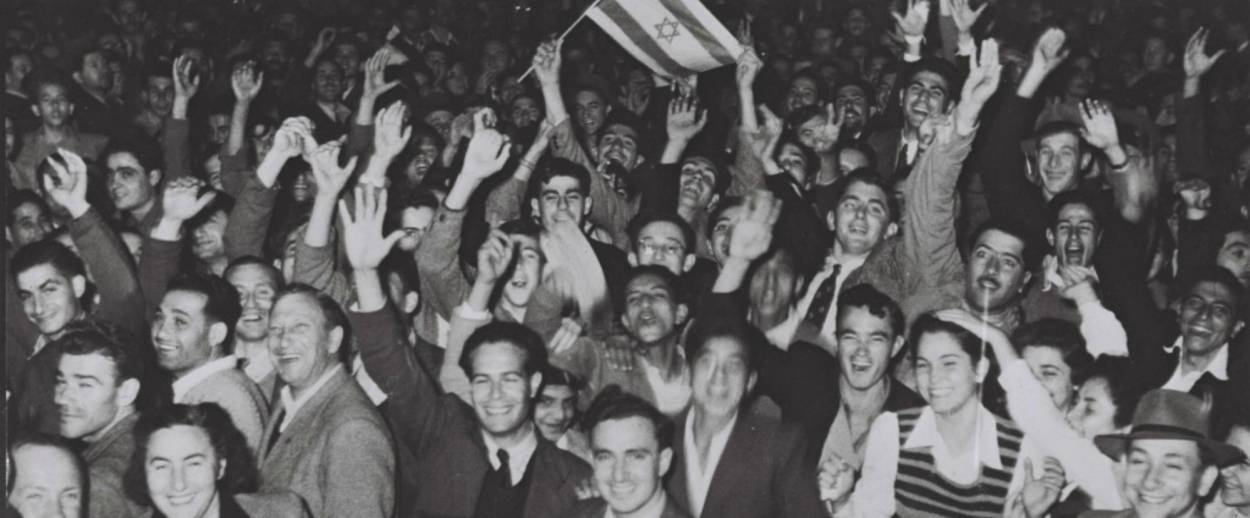‘No Longer Will We Vie for the Goodwill of Others’: Remembering the UN Vote That Paved the Way to the Birth of Israel
Seventy years ago today, the historic event led to spontaneous outbursts of joy, as one eyewitness recalls




Seventy years ago today, on November 29, 1947, the United Nations voted in favor of a resolution that adopted the plan for the partition of Palestine, paving the way to the establishment of the State of Israel. It was a moment of great joy for Jews all over the world. Ezriel Carlebach, a legendary Israeli journalist, was in New York to cover the vote. His recollections were translated by Liel Leibovitz):
Seven thousand Jews crowded the Nicholas Hall one hour after the historical declaration, and 10,000 more blocked the entrance to the subway. Many thousands filled the streets surrounding the UN building. The morning papers announced that Weizmann and Shertok will soon give speeches. The Jews brought ladders and climbed up to the hall’s windows. They danced the Horah down Broadway. They grabbed the coat of any resident of the land of Israel they could find, surrounded him and danced around him. The police arrived to restore the order, but eventually it handed its loudspeakers over to the crowd. Anyone from the land of Israel climbed atop the cop car and delivered impromptu talks.
Inside, the old labor leader, Schlossberg, covered his head, and, with tears in his eyes, said, “let us all bless shehecheyanu.”
Seven thousand Jews inside the hall, and scores more outside, blessed in one voice: shehecheyanu.
Blessed are we for living to see this day.
Us, and not the six million, said Shertok.
We imagined Warsaw in front of our eyes. What might’ve transpired there tonight, under different circumstances. We imagined the thousands of Jewish towns, the hearts of millions of dreamers for whom the state was established, all the young and the old led to the gas chambers with this one hope beating in their hearts. All the warriors who fought for the state, all those who struggled with malaria, all those murdered in the land of Israel, all those imprisoned as they did battle, all those who gave their lives so that we may live. Shehecheyanu.
Thousands of shops in New York were shut today. Next to machines in factories were loudspeakers broadcasting the General Assembly’s session. All ears and all hearts were in the UN, not at work. When the vote was over, the machines stopped. People hugged each other. Had a drink, celebrated, ran home.
“My cab was driving in midtown,” Abba Hushi told me, “and the radio was broadcasting ads for coffee and soap. Suddenly, the broadcast was interrupted with a special announcement: The UN had voted in favor of a Jewish state. The driver stopped the car in the middle of traffic. He jumped out, pulled me outside, and kissed me. ‘I’m a Jew!’ he said ‘And now I have a state!’”
Shehecheyanu.
We were blessed. We remembered all of our leaders, from Herzl onwards, who led us in the wilderness for generations without themselves seeing the promised land. I recalled the snowy displaced persons’ camps, in the desolate villages of Germany. I heard the quivering heartbeats of their inmates. I heard their voices calling for liberty for all Jewish captives reverberating throughout the four corners of the world. I remembered those who set out to immigrate to Israel and never made it, curtailed in the midst of their journey. Shehecheyanu.
Ten thousand Jews carrying Weizmann onto the stage in their arms, proclaiming him the first president of the Jewish state. Weizmann cannot find the words. The occasion is too momentous for words. In the Yiddish of his father’s home, he says: ‘This is not a time for speeches but for actions.’ He says that immediately after the Balfour Declaration the British foreign minister said to him: ‘Now you’re in the saddle, but remember that the future of the Jewish state is like the Baltic Sea. It may seem small and quiet and good for sailing, but suddenly you run into icy mountains that block the way, and you smash your head against these obstacles.’ We’ve smashed our heads against the icy mountains. We’ve been tossed back. But we overcame and found our way to a safe harbor. Weizmann is moved to his core, and he concludes with a blessing: Shehecheyanu.
We’ve been blessed. Blessed to see this great change in our lives. We’ve grown up dependent on others. Our fathers groaned for two thousand years under the yoke of other nations, and today we stand on our own two feet. We are going to live differently. No longer will we live as beggars, pleading for the mercy of the nations. No longer will we vie for the goodwill of others. We are masters of our own fate now.
We still do not understand this change. The diaspora is too deeply ingrained in our blood. When the Lord restored the fortunes of Zion, we were like those who dream. The gentiles understand this easily, and congratulate every Jew they see. For them, it’s taken for granted, it’s how they live their lives.
But are we a nation like all others? Unbelievable.
All we know is this: It’s going to be very difficult. We’ve a plethora of problems that we haven’t needed to address for 2,000 years. We know that as the past disappears, questions we’ve never dreamed of arise. We know that we’ll suffer many more victims, and years of indescribable suffering.
But we stand on this moonlit night outside the UN building. Next to all the poles bearing all the flags of all the world’s free nations, we know there will soon fly one flag more, ours. And we bless: Shehecheyanu.
Ezriel Carlebach (1909-1956) was a prominent Israeli journalist and the editor-in-chief of two of the nation’s largest newspapers, Yediot Aharonot and Ma’ariv.